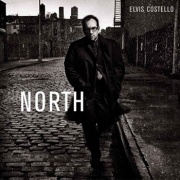Sydney Morning Herald, September 27, 2003: Difference between revisions
(start page) |
(formatting +browser +tags) |
||
| Line 10: | Line 10: | ||
---- | ---- | ||
{{Bibliography text}} | {{Bibliography text}} | ||
This is as intimate an album as Elvis Costello has ever fashioned. More intimate than we might have imagined from a man who always followed his own advice: ''"Don't wear your heart out on your sleeve, when your remarks are off the cuff."'' | This is as intimate an album as Elvis Costello has ever fashioned. More intimate than we might have imagined from a man who always followed his own advice: ''"Don't <!-- wear --> put your heart out on your sleeve, when your remarks are off the cuff."'' | ||
It's stripped of the wordplay and abstractions that have both defined his style and enabled him to deflect attempts to infer the personal. Instead he speaks directly and plainly, not hiding the flood of conflicting emotions behind the bland expression falling in love. | It's stripped of the wordplay and abstractions that have both defined his style and enabled him to deflect attempts to infer the personal. Instead he speaks directly and plainly, not hiding the flood of conflicting emotions behind the bland expression falling in love. | ||
Love isn't combat here but, at first, ebb and flow, doubt and exultation — a stumbling in and quick step back in defence. And then the early hesitance of the protagonist falls away to reveal the most unabashed moments Costello has ever committed to paper. From "all the words you say to me have music in them" in "When It Sings," to the self-mocking "Let Me Tell You about Her," where the newly-in-love finds himself so voluble about this woman that ''"when I start to speak [friends] roll their eyes"'' | Love isn't combat here but, at first, ebb and flow, doubt and exultation — a stumbling in and quick step back in defence. And then the early hesitance of the protagonist falls away to reveal the most unabashed moments Costello has ever committed to paper. From ''"all the words you say to me have music in them"'' in "When It Sings," to the self-mocking "Let Me Tell You about Her," where the newly-in-love finds himself so voluble about this woman that ''"when I start to speak [friends] roll their eyes,"'' we are amidst happiness without calculation. | ||
The lyrical intimacy is matched by the vocal closeness. Costello sings primarily down in his rarely used baritone register, his phrasing precise but intense, and there's none of the reach demanded by the songs on ''The Juliet Letters'' or ''Painted | The lyrical intimacy is matched by the vocal closeness. Costello sings primarily down in his rarely used baritone register, his phrasing precise but intense, and there's none of the reach demanded by the songs on ''The Juliet Letters'' or ''Painted From Memory'', the two closest comparisons in his catalogue. Essentially, he croons. | ||
Musically these 11 ballads are decidedly intimate. There are no big pop hooks and no dramatics. You won't find yourself swept away at first (or even on second or third listen). Instead there's the accretion of elements such as down-tempo jazz chords ("You Turned to Me" has several Charles Mingus-like phrases), the swell of strings lifting a cloud, the quietly searching piano lines or the mellowness of a flugelhorn. | Musically these 11 ballads are decidedly intimate. There are no big pop hooks and no dramatics. You won't find yourself swept away at first (or even on second or third listen). Instead there's the accretion of elements such as down-tempo jazz chords ("You Turned to Me" has several Charles Mingus-like phrases), the swell of strings lifting a cloud, the quietly searching piano lines or the mellowness of a flugelhorn. | ||
| Line 24: | Line 24: | ||
{{cx}} | {{cx}} | ||
{{tags}}[[North]] {{-}} [[Riot Act]] {{-}} [[When It Sings]] {{-}} [[Let Me Tell You About Her]] {{-}} [[The Juliet Letters]] {{-}} [[Painted From Memory]] {{-}} [[You Turned To Me]] {{-}} [[Charles Mingus]] {{-}} [[Nat King Cole]] {{-}} [[Frank Sinatra]] {{-}} [[Vanity Fair, November 2000#Frank Sinatra|In The Wee Small Hours]] | |||
{{cx}} | |||
Copyright © 2003. The Sydney Morning Herald. | Copyright © 2003. The Sydney Morning Herald. | ||
| Line 30: | Line 31: | ||
{{Bibliography notes}} | {{Bibliography notes}} | ||
{{Bibliography next | |||
|prev = Sydney Morning Herald, September 20, 2003 | |||
|next = Sydney Morning Herald, September 18, 2004 | |||
}} | |||
'''Sydney Morning Herald, September 27, 2003 | '''Sydney Morning Herald, September 27, 2003 | ||
---- | ---- | ||
[[Bernard Zuel]] reviews ''[[North]]''. | [[Bernard Zuel]] reviews ''[[North]]''. | ||
{{Bibliography | {{Bibliography images}} | ||
[[image:North album cover.jpg|180px|link=North]] | |||
{{Bibliography notes footer}} | {{Bibliography notes footer}} | ||
Latest revision as of 18:05, 26 March 2024
|
